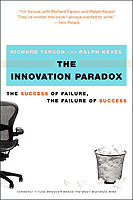
|
 |
The Innovation Paradox: The Success of Failure, the Failure of Success Previously Whoever Makes the Most Mistakes Wins: The Paradox of Innovation Richard Farson and Ralph Keyes 
Format: Paperback, 144pp. ISBN: 9780743225939 Publisher: Free Press Pub. Date: Reprint edition July 2, 2003 Average Customer Review: For Bulk Orders Call: 626-441-2024 Description and Reviews From The Publisher: Success in today's business economy demands nonstop innovation. But fancy buzzwords, facile lip service, and simplistic formulas are not the answer. Only an entirely new mindset -- a new attitude toward success and failure -- can transform managers' thinking, according to Richard Farson, author of the bestseller Management of the Absurd, and Ralph Keyes, author of the pathbreaking Chancing It: Why We Take Risks, in this provocative new work. According to Farson and Keyes, the key to this new attitude lies in taking risks. In a rapidly changing economy, managers will confront at least as much failure as success. Does that mean they'll have failed? Only by their grandfathers' definition of failure. Both success and failure are steps toward achievement, say the authors. After all, Coca-Cola's renaissance grew directly out of its New Coke debacle, and severe financial distress forced IBM to completely reinvent itself. Wise leaders accept their setbacks as necessary footsteps on the path toward success. They also know that the best way to fall behind in a shifting economy is to rely on what's worked in the past -- as when once-innovative companies like Xerox and Polaroid relied too heavily on formulas that had grown obsolete. By contrast, companies such as GE and 3M have remained vibrant by encouraging innovators, even when they suffered setbacks. In their stunning new book, Farson and Keyes call this enlightened approach "productive mistake-making." Rather than reward success and penalize failure, they propose that managers focus on what can be learned from both. Paradoxically, the authors argue, the less we chase success and flee from failure, the more likely we are to genuinely succeed. Best of all, they have written a little jewel of a book, packed with fresh insights, blessedly brief, and to the point. Reviews "Farson and Keyes got it right. A timely and compelling book." —Warren Bennis From the "learn from your mistakes" school of thought comes Whoever Makes the Most Mistakes Wins: The Paradox of Innovation. Today's business world calls for taking risks and accepting setbacks, say authors Richard Farson (Management of the Absurd) and Ralph Keyes (Chancing It). In this tiny volume, they cite examples from Rudy Giuliani's performance amid the chaos of September 11 to inventor Charles Kettering's perseverance in the face of adversity. Recognizing obstacles is essential to victory, Farson and Keyes contend, and despite their book's brevity, they demonstrate concrete ways to do so. —Publisher's Weekly, Copyright 2002 Cahners Business Information, Inc.
About the Authors Richard Farson has led several organizations noted for innovative programs. Farson helped found the Western Behavioral Sciences Institute in 1958 and remains its president. In this capacity he directs its International Leadership Forum, an Internet-based think tank that brings influential leaders together to consider critical policy issues. A University of Chicago Ph.D. in psychology, Farson has been a naval officer, college dean, research director, organizational consultant, and a Fellow of the Harvard Business School's Human Relations Faculty. He is the author of several books, including the critically acclaimed bestseller Management of the Absurd, now published in eleven languages. Farson lives in La Jolla, California. Ralph Keyes is as eclectic as he is innovative. His books include Chancing It (a New York Times Notable Book), The Courage to Write ("one of the two or three best books on writing I've ever read," said John Jakes), and Is There Life After High School? which was made into a Broadway musical that is produced regularly around the country. A former assistant to the publisher of Newsday, Keyes is a Fellow of the Western Behavioral Sciences Institute. He lives in Yellow Springs, Ohio. Table of Contents Acknowledgments Introduction 1 The Success-Failure Fallacy
Tangled Line 2 The Agony of Victory, the Thrill of Defeat
Like Making Love 3 Nothing Succeeds Like Failure
Bards of Failure 4 Nothing Fails Like Success
Marooned by Success 5 The Success Hobble
The Ashes of Success 6 Innovating with Attitude
The Risk-Friendly Workplace 7 Managing in the Postfailure Era
Treating Success and Failure Alike 8 Fear Management
The Underlying Fear 9 Samurai Success
Winning Isn't Anything |
|

The Essential Lists BOOKS TO READ BEFORE YOU LEAD 
Grow Your Leadership Skills NEW AND UPCOMING LEADERSHIP BOOKS 
Classic Leadership Books BOOKS TO READ BEFORE YOU LEAD |
 |
| ||
 | © 2019 LeadershipNow All materials contained in https://www.LeadershipNow.com are protected by copyright and trademark laws and may not be used for any purpose whatsoever other than private, non-commercial viewing purposes. Derivative works and other unauthorized copying or use of stills, video footage, text or graphics is expressly prohibited. |
||